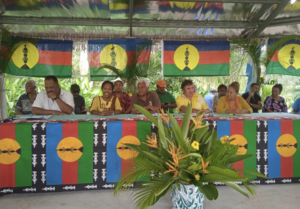Macron and his government have taken a spectacular step towards adopting a discriminatory, racist and xenophobic policy towards non-EU foreigners, with the support of the far right, writes Léon Crémieux.
The law that has just, in December 2023, been passed in France by a joint vote of the Macronist alliance, the right-wing LR party and the far-right RN is the most regressive in France since the one passed almost 40 years ago, in 1986 (Pasqua law) and it contains even more reactionary aspects. It is totally in line with the premises of the far right, which designates foreigners and immigration as a danger, a threat to the country, stirring up the fantasy of “a flood of migrants”, of the economic and social imbalance created by migrants, and confusing immigration with insecurity, delinquency and the threat of terrorism. These themes are widely developed in Europe, but particularly in France by Marine Le Pen’s RN and Marion Maréchal and Éric Zemmour’s small Reconquête party.
Over the last twenty years or so, the traditional right has also made them widely popular, gradually picking up on the ideological propaganda of Jean Marie Le Pen and the Front National on these issues. In the early 2000s, Nicolas Sarkozy in particular tried to divide French society by introducing a debate on “national identity”, even incorporating this concept into the title of the Ministry of the Interior, designated as the “Ministry of the Interior and National Identity”, following the idea of one of his advisers, Patrick Buisson, who came from the “revolutionary nationalist” far right of the 1970s.
Macron and his government have therefore also taken these muddy paths, initially thinking they were making a parliamentary manoeuvre to destabilize the Republican party. The manoeuvre turned into a boomerang against the presidential camp.
At the start of his second term, in the summer of 2022, Macron and his interior minister, Gérald Darmanin, announced the presentation of a new law on entry and residence conditions, centred on the right of asylum, just three years after the one he had pushed through in 2019. Explicitly equating delinquency with asylum seekers, the announced aim was to fight to “prevent non-European migratory flows”, “speed up procedures for asylum seekers” and “deportation procedures”, all classic reactionary themes.
Above all, at a time when people’s main concerns were inflation, the crisis in the healthcare system and threats to pensions, the main aim was to try to polarize public debate on this issue by brandishing the “unbearable threat of migration” and, once again, to blame migrants for the social situation of the working classes. Darmanin’s stated aim was to “make life impossible for migrants”. His arrogant profile was even that of a “Mr Plus”, boasting that he was tougher on migrants than the far right, speaking with a touch of sexism about Marine Le Pen’s “softness” and Georgia Meloni’s “inability to deal with migration problems”. This bill was fought from the outset by the social movement and the left, with the Unis contre l’immigration jetable (United Against Disposable Immigration) (UCIJ) collective bringing together 800 collectives and associations (including hundreds working on a day-to-day basis for the reception of and solidarity with undocumented migrants and asylum seekers), with the support of the Greens, LFI and the radical left, including the NPA.
Since the June 2022 elections in which Macron emerged without a parliamentary majority or an alliance with other parties, he and his government have had to negotiate bill by bill with the other parties, mainly the party of the traditional Gaullist right, the Republicans (LR). As a result, they voted for two-thirds of the legislation introduced by the government between June 2022 and June 2023 on a piecemeal basis. Darmanin had therefore opened the door to dialogue with the LR on his legislation. The rise of the anti-retirement reform protests in the spring of 2023 forced the government to shelve the debate on this bill. The LR, for their part, saw the debate on this bill as an opportunity to regain a place in the political debate. The result of the June 2022 legislative elections – 62 out of 577 MPs, a loss of 51 seats – has reduced the Republicans to the position of Macron’s auxiliaries, behind the Rassemblement National and France Insoumise, and they are finding it hard to exist as an independent force, squeezed between Macron and the Rassemblement National.
Moreover, many Macronist leaders are transfers from LR and Nicolas Sarkozy has on several occasions called on the party he led for a long time to form an alliance with Macron. As a result, in spring 2023 LR attempted a political operation by themselves introducing two laws attacking immigration and foreigners living in France. Considering that this was the only ground on which they could make a voice different from Macron’s, their bills seamlessly took up the main elements of the Rassemblement National’s programme, notably adopting “national preference”, discriminating against social rights for non-EU foreigners with reduced entitlements to social benefits, going back on “droit du sol” for children born in France, introducing new obstacles to adopting French nationality, with stronger repression and faster deportations of undocumented foreigners. Over the past year, the LR party has developed an obsessive campaign against the flood of migrants, the invasion of migrants and the exorbitant cost of immigration, making itself much more vocal than the far right on this issue.
GROWING IDEOLOGICAL PRESSURE FROM THE FAR RIGHT
Although France has long been a country of immigration with open legislation, since the 1970s it has significantly tightened entry and residence rights. Still marked by the acquisition of nationality through “droit du sol”, the country practices the great divide between a welcoming attitude and increasingly closed practices. This is as true for immigration as it is for the reception of refugees. France, with 7.7% of its population made up of foreigners, is below the European average (8.4%), compared with 8.7% in Italy and Sweden, and 11-13% in Spain, Germany and Belgium. This is a far cry from the “over-generous policy” the government and its new friends constantly decry.
As far as refugees are concerned, the war led, in particular in 2014 and 2015, to an exodus of refugees from Syria. The reality is that most of the 6.8 million exiles remained in Turkey, Jordan and Lebanon. Only 17%, just over 1 million, applied for asylum in the European Union, with France registering 2.2% of these 17%… around 25,000! In the case of Afghans, the effort was slightly greater, with France accounting for 8% of Afghan refugees in Europe. Similarly, while there are around 4.6 million Ukrainian refugees in the EU and 120,000 in France, and no one has protested against the arrival of a population that is “lucky” not to be of Muslim origin, here again the figure is not at all commensurate with France’s economic (17%) and demographic (15%) weight in Europe. Macron’s pretentious and self-satisfied talk about “France’s share in welcoming refugees” is irrelevant. Especially since France has one of the lowest protection rates in Europe when it comes to asylum applications. Around 70% of asylum applications are refused protection status (refugee or subsidiary protection), leaving asylum seekers in irregular and precarious situations and at risk of being deported.
European and French leaders are living in schizophrenic denial about international migration. Migration is a natural and inescapable phenomenon in the past and present history of humanity, a phenomenon in which Europeans themselves have participated and continue to participate, and which today affects Africa and the Middle East much more than Europe. But reactionaries are trying to turn it into a question of a war of civilizations, of barbarian invasion, of demographic submersion. Unfortunately, it is true that wars and climate change will accentuate migratory phenomena, once again without the European Union being the first destination. The EU’s denial is obviously that it is one of the main culprits of climate change, directly through environmental pollution and indirectly through European industrial and commercial capitalist groups, that it maintains neo-colonial relations with the countries of the South, causing some of its citizens to leave their homes, that its foreign policy is also responsible for open conflicts and wars, with all their human catastrophes, but that it wants to hinder natural migratory flows, putting hundreds of thousands of men and women at extreme risk, and leading to the deaths of tens of thousands of human beings on the migration routes.
The other denial is that France and the EU as a whole are themselves organizing international immigration, which is largely legal, organized by the European states because it is part and parcel of the European economic and social system. In 2022, for every 350,000 undocumented migrants entering the European Union, 3.5 million did so legally. And beyond the purely ideological reactionary demagoguery, three reactions in France following the vote on the law were characteristic: that of 3,500 doctors, including emergency doctors, that of the presidents of the major universities and the heads of the grandes écoles, and that of the President of the MEDEF. The doctors protested against the threat of abolition of the Aide Médicale de l’Etat (AME) and publicly undertook to continue to provide free care to undocumented migrants if the AME were abolished, out of respect for the “Hippocratic Oath” to treat anyone who is ill and out of concern for public health.
The presidents of the universities and the heads of the grandes écoles are protesting against the “return guarantee” system, which already exists in other European countries (a sum that foreign students will have to deposit in their bank account before arriving in France), and against the limitation of social assistance that foreign students will have to endure from now on, on the pretext of the fantasy of “false students taking advantage of the social systems”. There are currently around 400,000 foreign students in France, or 13% of the total. They are a pillar of the university system, particularly in the grandes écoles, and contribute to its vitality and, of course, to the internationalization of university education for students, including 70,000 PhD students….far from the xenophobic fantasies of bogus students that are the obsession of Ciotti, President of the LR party, and Darmanin.
The latest reaction came from Patrick Martin, President of the MEDEF, who said that “unless we reinvent our economic model”, 3.9 million more foreign workers will be needed in France in the coming years, and at least the same number in the rest of the European Union. Because, unlike the spokespersons of the LR and RN parties, employers are aware of a reality that has long been proclaimed by OECD economists: far from being a financial burden for host countries, foreign and migrant populations in all OECD countries present a “net balance sheet” surplus in the budgets of host countries. In a chorus of nonsense over the last few months, a member of the French Nationalist Party picked up on an article in the right-wing daily Le Figaro, which claimed that immigration “costs more than it brings in” and quoted a figure of 53.9 billion. Other figures were quoted, but always with the common thread of the idea that foreigners come to take advantage of the social system, living off social benefits and unemployment insurance. The reality of the exhaustive studies carried out by the OECD in 2021, covering the period 2006/2018, is that in the 25 countries studied, the net budgetary contribution is always between -1% and +1% of GDP, with an average surplus of 10 billion euros per year for France during this period. Beyond these accounts, the obvious reality is that foreigners obviously participate in the economic life of the country where they are, often in Europe with less well-paid work and more difficult working conditions. These difficulties stem both from the difficulties that some people have in regularizing their situation and from the climate of discrimination that makes access to employment more difficult, not only for foreigners but also for the descendants of 2nd or even 3rd generation foreigners. Maintaining this climate of racism is obviously a weapon used by employers. But employers in sectors which, by definition, cannot relocate their activities, such as transport, logistics, the hotel industry, construction and care, very often call on foreign workers or workers with an immigrant background.
And the reality in Europe is that the natural demographic curve is now on a downward trend everywhere, excluding net migration, and France is no exception to this trend. So, behind the rhetoric of the more or less extreme right-wingers, which serves to divide the working classes and keep them away from the people who are really responsible for the policies of social breakdown, there is obviously the inescapable reality that not only is immigration not a cost, but that to try to hinder it would be to create a social and economic imbalance over the coming decades. The hypocrisy of the dominant classes is that they most often support the discourse of the extreme right, and cultivate it in their written and broadcast media, fantasizing about the “suction power” that the slightest regularization of undocumented migrants would represent, while at the same time thinking about the present and the future by integrating the reality of a continuing influx of migrants. A utilitarian, hypocritical policy that deprives millions of men and women of social rights and decent living conditions, that maintains discrimination and police violence in working-class neighbourhoods where many children of immigrant origin live, but that nevertheless maintains the immigration nets that are essential to economic and social equilibrium.
This policy is even more serious when it comes to migrants and undocumented migrants trying to reach Europe via the Mediterranean or continental borders. The right, the far right and their media relays talk about flooding, when the figures tell a different story: according to government figures, there are between 4 and 5 million undocumented migrants in Europe, or less than 1% of the total population. Half of them live in Germany and the UK, around 700,000 in France and between 5 and 700,000 in Italy. But the fantasy of submersion and xenophobic and racist propaganda justify inhuman treatment for those who want to come to Europe. Tens of billions are spent on securing and controlling borders, turning back arrivals and negotiating with African and Middle Eastern countries to block border crossings. These amounts are to be compared with the small sums granted for reception, housing and aid to migrant populations. Refugees from Ukraine were the only population to be granted “temporary protection status” by the Council of the European Union. In France in particular, they were the only ones to benefit from proper reception conditions: immediate residence permit, access to the labour market and housing, medical assistance and access for children to education, the right to open a bank account. These rights should obviously apply to all asylum seekers from Syria, Afghanistan or elsewhere.
DARMANIN AND MACRON CAUGHT IN A TRAP
So, with regard to the continuation of the debates on this law in the spring of 2023, the Republicans, in their anti-immigration bills presented in May 2023, also wanted a change to the Constitution so that France could derogate from European law regarding obligations towards asylum seekers, and oppose any regularization of undocumented migrants in so-called “short-staffed” occupations (the hotel industry in particular), which is what Darmanin proposed in his bill. They also wanted to abolish state medical aid (AME), which gives undocumented migrants access to healthcare covered by the social security system in hospitals (380,000 people benefited from this in 2023). Darmanin and the government were opposed to this abolition.
LR, still benefiting from a majority in the Senate, thought it could bring strong pressure to bear to force Darmanin and Macron onto its turf. Darmanin, for his part, hoped that by adopting some of the measures proposed by the LR, he would get at least some of their MPs to vote in favour of his plan, further weakening the LR in the Assembly. This sordid political game on the backs of foreigners also served Darmanin’s purpose in trying to find his place in the race to succeed Macron as president in 2027.
Darmanin’s bill was therefore put on hold until the start of the new academic year in 2023. Here again, after 6 months of mass protests over pensions, after the revolts in working-class neighbourhoods over the summer in the face of violence and the murder of young people by the police, the government wanted to stigmatize the population of immigrant origin and stifle the social concerns that are predominant among the population: purchasing power, health, the environment…. These concerns are clearly evident in social mobilizations, and even in recent opinion polls (IPSOS institute, September 23, for example, where immigration only appears in ninth place as a concern for those polled). The hyperbolization of migration issues in the media arsenal of the extreme right and reactionary leaders has maintained a nauseating climate aimed at mixing immigration, insecurity and Islamism and making this amalgam the main political issue, with the predominant help of the network of media and written press that are in the hands of the main French capitalists, first and foremost the media galaxy in the hands of Bolloré… This issue did indeed occupy the field of public debate from September to December, but not with the outcome that Macron and his government wanted.
Hoping to manoeuvre as it did on a number of other issues, the government’s timing was simple. The debate began with a vote in the Senate in early November, where the Republicans amended Darmanin’s draft with all their measures borrowed from the far right. Then, at the beginning of December, the Assembly’s Law Committee, where the balance of power gave the government a relative majority, cleaned up the bill, bringing it back to its original version, a reactionary version that did not include many of the Senate’s additions (e.g. the abolition of the AME, the 5-year period of legal residence to obtain social benefits, regularization in “short-staffed” occupations). Then, logically, the game of abstentions should have enabled Borne and Darmanin to pass the law, article after article, counting on the contribution of votes from the Republicans and abstentions from the Socialist Party, depending on the articles of the law.
And that’s when things started to go wrong. The ecologists, opposed to the bill along with all the NUPES groups, tabled a motion to reject the bill, thereby blocking its consideration by the Assembly. On 11 December, against all expectations, this motion was adopted by a majority vote of the NUPES, but also of 2/3 of the LR and RN MPs: 270 votes in favour of rejection and 265 against. The trap then closed on Darmanin and his government. There could no longer be an article-by-article vote in the Assembly on the government’s version. Macron had the choice between withdrawing his text altogether or making a new attempt at compromise by jointly drafting a new text between MPs and senators (in a joint committee (commission mixte paritaire – CMP)), followed by a block vote in each of the two chambers on the same text. After suffering a resounding defeat and being outvoted in the Assembly for the first time, Macron refused to acknowledge his failure by withdrawing the law. He preferred to put the bill in the hands of the Republicans, since it was only possible to write a joint text in this 14-member CMP (7 deputies and 7 senators) through an agreement between the 5 Macronists and the 5 right-wing Republicans and centrists. In reality, the new draft was negotiated directly between the Prime Minister, Elisabeth Borne, and the Republican leadership.
The text, which was ultimately voted through by the Assembly and Senate, is therefore a very close copy of the positions of the LR, inspired by the Rassemblement National. The latter, without having taken part in the slightest negotiation, and even displaying their hostility right up to the end to a draft they found too moderate, finally seized the opportunity to show their support by voting for a text largely inspired by their positions, creating a general outcry. This is the first time in 40 years that traditional forces have voted for the same text as the far right on immigration. In addition, Prime Minister Elisabeth Borne has formally committed to a parliamentary vote to revise the Aide Médicale de l’Etat. While Macron and Darmanin had hoped that this law would provide a political “coup” by fracturing the Republicans and isolating the RN on its own favourite terrain, the outcome was the opposite: the RN appears to be the political winner of a law that takes up its xenophobic obsessions and adopts national preference, discrimination for social benefits and tougher conditions for naturalization. Thanks to their control of the Senate, the LR parties have emerged stronger, while the Macronists have emerged weakened and divided: only 131 out of 171 MPs voted in favour of the law, 20 voted against and 17 abstained, the “Young with Macron” group has disavowed the law and the Minister of Health has resigned from his post.
THE URGENT NEED FOR A LEFT-WING RESPONSE
The weakened position that Macron had after his second election had already been shattered by the huge mobilization in defence of pensions, and then by the revolts in working-class neighbourhoods at the start of the summer. The government now appears to be a mere hostage of the right and the far right.
On the left and in the NUPES, unfortunately, this shift towards the far right is having trouble creating the necessary jolt. The government, backed by a relentless, multi-faceted press campaign, has done everything in its power over the past year to discredit the NUPES, which emerged as the leading opposition force in the elections, and first and foremost France insoumise, ostracized and demonized by Macron and Borne as having “left the republican arc” (following, in particular, its stance during the uprisings in working-class neighbourhoods and on the murders committed by police officers) while the tricolour carpet was rolled out beneath the feet of the RN. Maximum pressure was therefore exerted to push for the break-up of this alliance, which was never able to go beyond the status of a parliamentary intergroup. The components of the NUPES, for various reasons, have themselves always refused to build a national popular political force, structured in the towns and neighbourhoods. Despite the convergent positions of its components in support of the mobilization for pensions, no political momentum was created on that occasion. For several months now, it has been the electoral question of the 2024 European elections that has seen the centrifugal tendencies bring the NUPES to a standstill and lead to its de facto break-up, with the parties allied to the FI refusing to present a united list, in particular because they did not want to adopt the radical programme of the NUPES on the European Union.
Despite the broad convergence of the trade union and community movement against police violence and, more recently, to demand an immediate ceasefire in Gaza in the face of the massacre perpetrated by the Israeli army, the left-wing opposition to Macron today appears incapable of building a real united political and social balance of power. Nevertheless, following the December vote tens of thousands of activists were up in arms at the sight of the far right dictating government policy. In April 2022, half the votes for Macron against Le Pen came from left-wing voters wanting to block Le Pen‘s Rassemblement national.
Around the calls of the UCIJ coalition thousands of people took to the streets in several towns. But the challenge at the start of this year will be to build a united popular force and mobilization to match the social demands and the threat of the far right.
31 December 2023
Originally published by Fourth International: https://fourth.international/en/europe/570
Photo Credit: Copyright Photothèque Rouge / Martin Noda / Hans Lucas
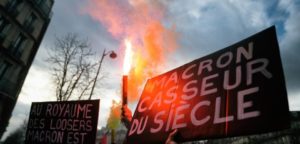

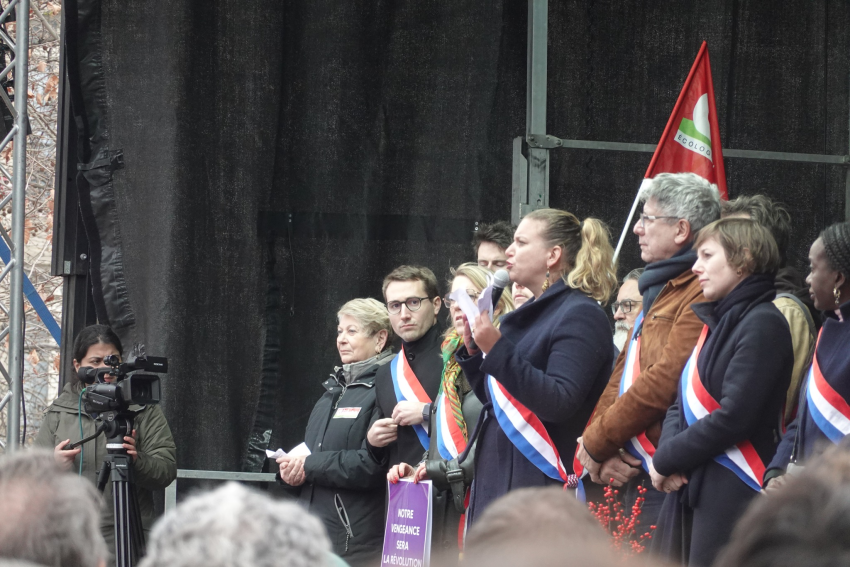
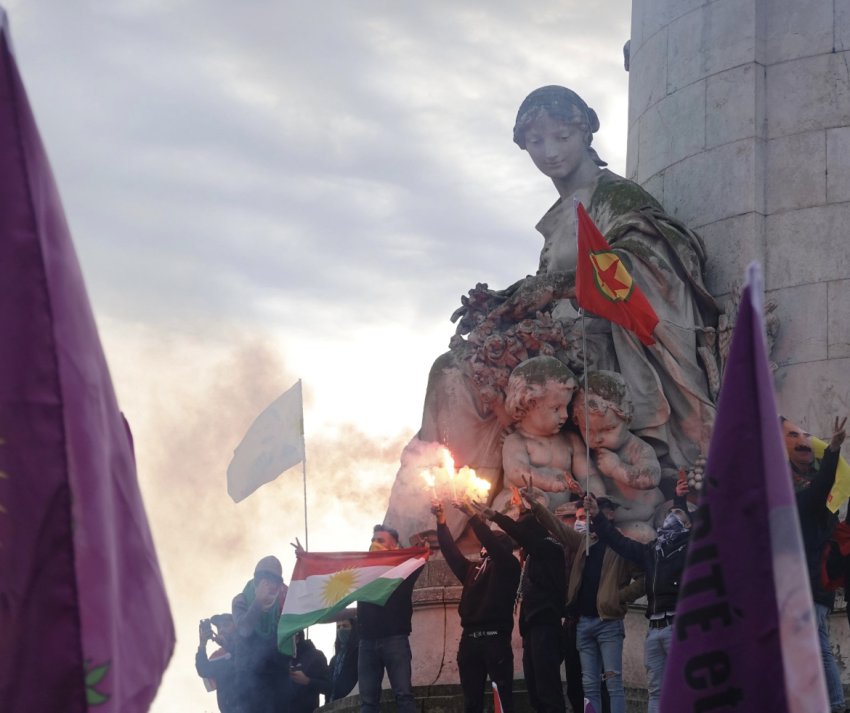
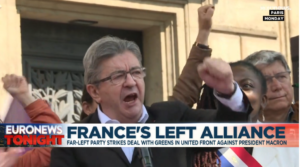 Dave Kellaway reports on the first round of the French parliamentary elections.
Dave Kellaway reports on the first round of the French parliamentary elections.